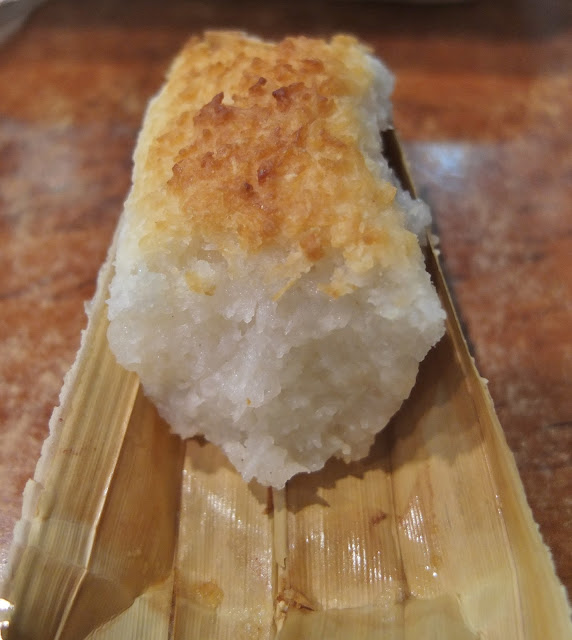This popular rice takeaway means ‘knocking rice’ in Malay. Word has it that the dish originated from the 1970s when a hungry
stranger - most possibly a ravenous student or working bachelor - had the gumption of knocking on someone’s kitchen door hoping to buy a packet of rice for
supper. Today, you can find Nasi Katok in most no-frills eateries or from certain homes that advertise it is sold via strung-up banners. What you get is some steamed rice laced with sambal (spicy ground chilli
paste), a small piece of egg and sliced cucumber in a paper wrapper. Some vendors offer different condiments such as sambal pusu (dried anchovies
sambal), sambal tahai (spicy dried fish sambal) and fried chicken to go with
your Nasi Katok. Prices usually range between B50 cents to B$1 or more per pack.
You haven't really been to Brunei without sampling this traditional delicacy. Bruneians are crazy over this thick, gluey and bland
paste that’s often eaten as a substitute for rice. It takes a bit of skill to dissolve and stir Ambulong (sago flour) in
some hot boiling water followed by tepid water to form that requisite lump-free, viscously sticky paste.
Then the opaque substance has to be twirled onto candas (wooden chopstick-like prongs) for eating, complemented by side
dishes of cacah (dips) e.g. cacah binjai (a dip made from a type of native sourish fruit) or tempoyak (fermented
durian paste), lalap daging (stir-fried beef jerky with chilli and onion) and pais
ikan (grilled marinated fish in banana leaves) among others.
You either like or hate it...I find the blandness a perfect foil for the tantalising dips and richly spiced dishes that are usually eaten with ambuyat. Its slightly gloopy texture goes down smoothly the throat without any chewing required but carries with it all the attendant flavours and tastes of whatever you're eating.
Aneka Rasa Restaurant doles out a deeply flavourful version; served
with beehoon, mee or kuay teow and condiments such as beef, chicken or
seafood, beansprouts, fried beancurd slices, crispy fried shallot and
mint leaves, the heartwarming broth sets you drooling with its melange of heady, aromatic spice nuances.
Don't pass up on sampling at least two or more of these sweet treats especially if you're visiting the Gadong Night Market. Whether it's kelupis (steamed glutinous or brown
speckled rice with either prawn or beef filling), selurut (steamed rice flour
rolls in tubular nyirik/nipah leaf casing), cucur pisang (Brunei's version of banana
fritters), wajid Jawa (sweet, sticky rice pudding), kuih tapai (fermented rice
in banana or simpur leaf parcels), bingka katilapam (steamed or baked fermented
rice cakes in rectangular nyirik leaf casings) or penyaram (saucer-shaped
fried palm sugar rice flour cakes), it's simply unthinkable not to satisfy your sweet tooth with such an irresistible plethora.
Surprisingly, the mee goreng here is a dead ringer for the good old Indian Muslim-style mee goreng that had firmly lodged itself in my memory as the 'gold standard'. Amazingly the dish boasts that same tricky balance of salty, sweet, tangy, spicy and bitter accents down pat; a vital missing piece from so many versions I had tried in the past.





.jpg)










